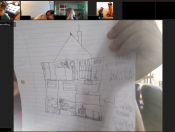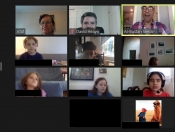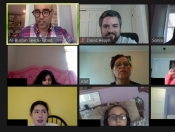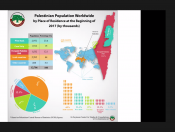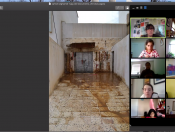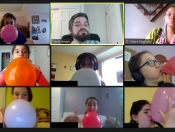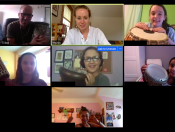I hoped to gain a new language and I did. The camp was better than my expectations because I had fun and learned so much! – camper
The camp exceeded our expectations. My daughter was looking forward to every activity offered throughout the day! She was so proud to recognize things (like Arab foods, words, and even Middle East politics) which she otherwise does not encounter outside our home. The exchange with Ramallah Friends School was extra special, since I am an alumnus. – parent Lara
These are some of the comments we heard from campers and parents after seven days of Al-Bustan Virtual Camp!
Speak to Us of Houses… Does not your house dream? and dreaming, leave the city for a grove or hill-top?
Kahlil Gibran’s On Houses inspired our campers to dream, create, and learn from within their homes, encouraging them to think of this moment as an opportunity rather than a concession. With participants from the Philadelphia area, NYC, Upstate NY, NJ, VA, and as far as Portlandt, campers produced elaborate works of art, rhythms, and dialogues, and came to better understand themselves, their own spaces, each other, and gained some insights on Arab art, culture, and history.
From July 10 to 20, campers were immersed in cross-cultural exchanges with students from Ramallah Friends School in Palestine, Arabic language learning, storytelling, art-making, and percussion. Two groups, one comprised of 4th-5th graders and another of 6th-8th graders, switched between online sessions led by four teachers, Moez Ben Mansour (Arabic), Lisa Volta (Art), Adara Dismuke (Storytelling), and Hafez Kotain (Percussion).
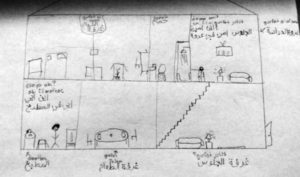
Arabic language class with Educator Moez Ben Mansour centered on “bayt”, with campers learning the names for rooms and objects in their home and typical greetings and conversation. In their culminating project, campers designed a house with the key words and phrases they learned in Arabic written, which they shared with in the final session. Each afternoon, many campers chose to continue practicing what they had learned in the morning session during Choice Hour, when campers had the option of working on their Arabic in small groups with Moez and Arabic-speaking counselors Sonia Hamaty and Afaf Kabalan.
In the mornings, campers had video exchanges with students at Ramallah Friends School in Palestine. The Ramallah students, most between ages 15 and 17 and bilingual in Arabic and English, gave fifteen minute presentations about life in Palestine then fielded questions from campers. Each day, a new pair of students presented, giving campers an opportunity to hear a range of perspectives. Presentations covered food, history, culture, geography, and daily life under Occupation in Palestine. Campers came prepared with inquisitive questions and at the end of the week shared their reflections with each other — the challenges Palestinians face each day going to/from school and passing through checkpoints was a striking realization, while on a lighter note, appreciating the variety in Palestinian savory and sweet cuisine led to them asking for recipes to try at home.
Visual Artist and Educator Lisa Volta led campers in the study of contemporary Arab artists who, through their artistic practice, interrogate the spaces they live in and interact with everyday: installation artist Mona Hatoum, animation artist Dina Amin, and multimedia artist and photographer Zahrah Alghamdi. Campers took inspiration from these artists and created at-home installations with paper mache and string and stop-motion animations with clay and household objects. Their week’s work in art-making culminated with a Virtual Art Show and Presentation, where each camper had the opportunity to speak about his or her work. Browse through this slideshow to see the art produced by our awesome campers!
Percussion Director Hafez Kotain provided a mix of live instruction and pre-recorded instructional videos that campers could learn from on their own. During Percussion sessions, they practice rhythms with Hafez, asked clarifying questions, and demonstrated for each other. On the last day, it was wonderful to see the campers showcase what they learned live or in a video that we shared on screen for everyone to enjoy. Here is a sampling of what our campers shared, playing the following rhythms: Fox-Wahda Saghira-Saidi-Maqsum-Masmudi Kabir:

Storyteller Adara Dismuke led students in creating and telling funny, lively, and moving stories from their own lives–touching upon Arab storytelling traditions and Arab folk stories throughout. Students worked daily in small breakout sessions to practice telling stories to each other, then to the larger group. The week culminated with each camper telling a three-minute story of his or her own creation.
We’re grateful for the dedication of our teachers and staff members Madeline Conley and David Heayn-Menendez. To see so much creative expressions from the campers was truly heartwarming. We were pleased to hear parents tell us how much it meant to them for their children to connect with other kids of Arab heritage — even through a screen!
We really just wanted to stay connected to Al-Bustan since we couldn’t attend in person this year. I think somehow, even though the kids and teachers/facilitators were apart, they got very close and gained an understanding of the kids in a way they may not have gotten in person. It was great! – parent Nuhar


